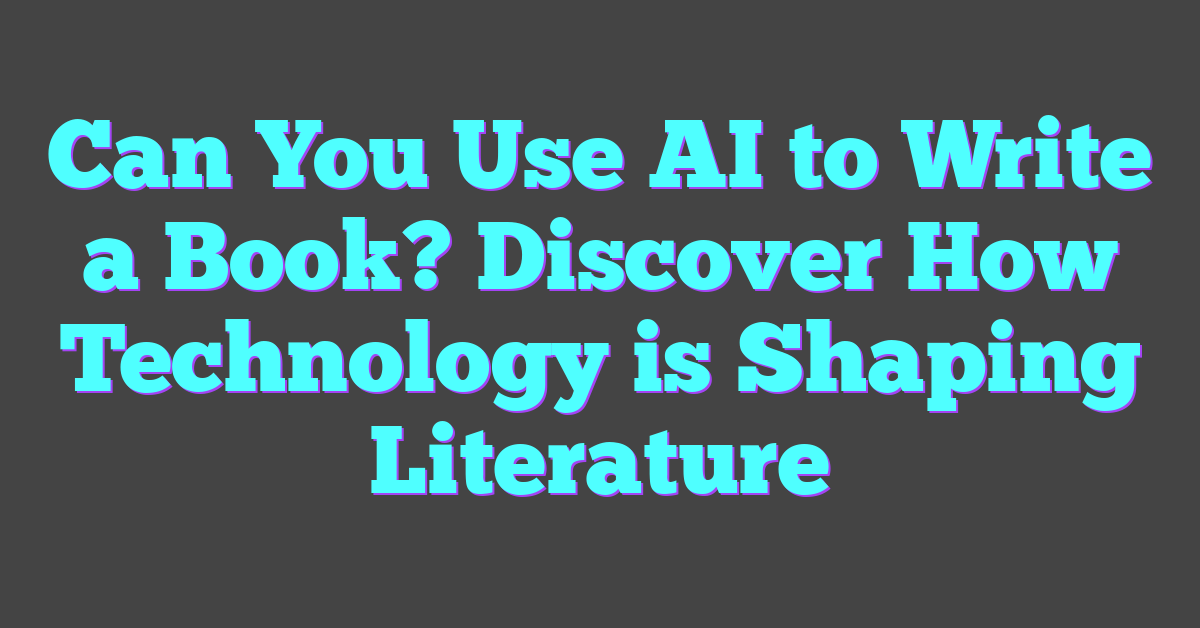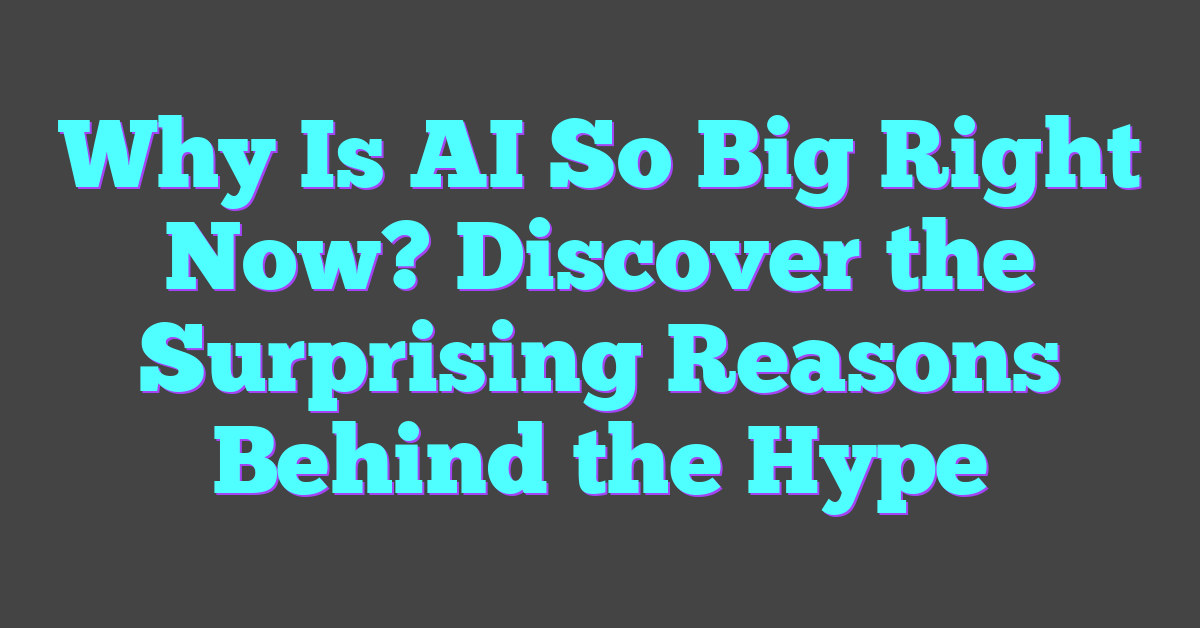Imagine a world where the next bestseller isn’t penned by a human but crafted by artificial intelligence. It sounds like the plot of a sci-fi novel, yet it’s increasingly becoming a reality. With advancements in AI technology, writers and tech enthusiasts alike are exploring the possibilities of using AI to write books.
AI’s ability to analyze vast amounts of data and generate coherent text has opened up exciting new avenues in storytelling. But can a machine truly capture the nuance and emotion that make a great book? This article delves into the fascinating intersection of literature and technology, examining whether AI can not only write a book but also create a compelling narrative that resonates with readers.
Exploring the Concept: Can You Use AI to Write a Book?
Artificial intelligence has made significant advancements in recent years. As an AI and machine learning expert, combining these technologies with content creation opens exciting new areas to explore.

What Is AI Writing?
AI writing involves using algorithms for generating text. These algorithms, often based on deep learning models like GPT-3, analyze vast amounts of data to understand language patterns. They then produce coherent and contextually relevant text based on input prompts. Such AI systems can write articles, stories, and even books by recognizing and imitating human writing styles.
How AI Assists in Book Writing
AI assists in book writing by automating specific tasks and enhancing creativity. Here are key ways AI can help:
- Plot Structuring: AI can suggest plot structures using analyzed data from various genres and successful books.
- Character Development: AI tools can generate character profiles, including traits, backgrounds, and relationships.
- Drafting Dialogues: AI can create dialogues that fit the narrative style and character personalities.
- Grammar and Style Checks: AI can correct grammatical errors and ensure the writing style is consistent.
- Data-Driven Insights: AI can provide insights based on reader preferences and trends, helping to tailor content to audience expectations.
AI’s ability to manage repetitive tasks allows writers to focus more on creativity and storytelling, making it an invaluable tool in the modern writer’s toolkit.
The Current State of AI Writing Tools
Artificial intelligence has revolutionized the writing landscape. AI-driven tools are now capable of generating text, assisting writers, and streamlining the creative process.
Popular AI Writing Software
Several leading AI writing software tools have emerged:
- OpenAI’s GPT-3: Utilizes vast datasets to generate polished text. It’s known for producing coherent and contextually accurate content.
- Jasper AI: Specializes in digital marketing content, making it ideal for blog posts and ads.
- Sudowrite: Aids fiction writers by offering suggestions for plot, characters, and dialogue.
- Grammarly: Focuses on grammar and style, ensuring the text is error-free and polished.
Comparing Features and Limitations
When comparing features, several points stand out:
- GPT-3: Delivers high-quality text but may require extensive editing for niche topics.
- Jasper AI: Excels in marketing content but might lack versatility for other writing forms.
- Sudowrite: Provides creative writing assistance, though it may struggle with complex literary elements.
- Grammarly: Offers excellent grammar checks yet doesn’t generate original content.
Limitations include:
- Context Understanding: AI struggles with nuanced understanding and emotional depth.
- Creativity: Human creativity and originality remain unmatched.
- Editing Necessity: AI-generated content often requires heavy human editing to ensure quality.
By leveraging these tools, writers can enhance productivity, though human oversight is essential for achieving truly engaging and compelling narratives.
Benefits of Using AI for Writing Books
Recent advancements in artificial intelligence and machine learning have revolutionized the literary world. AI tools enhance various aspects of book writing, offering multiple benefits.
Speed and Efficiency
AI automates repetitive tasks, boosting productivity. Writers often spend hours structuring plots and editing grammar, but AI tools like GPT-3 handle these tasks within minutes. This accelerated process allows authors to focus on crafting unique storylines and perfecting their narrative voice.
| Task | Traditional Time | AI-Assisted Time |
|---|---|---|
| Plot Structuring | Several hours | Few minutes |
| Grammar Checking | Several hours | Few minutes |
Overcoming Writer’s Block
AI tools provide fresh ideas and prompts, helping writers overcome creative ruts. When faced with writer’s block, tools like Jasper AI suggest sentence completions and new plot directions, rejuvenating the creative process. This can inspire authors to explore new avenues in their storytelling.
AI’s integration into book writing is transforming the process by enhancing speed, efficiency, and creativity. These tools offer invaluable support, allowing writers to focus on what they do best: telling compelling stories.
Challenges and Ethical Considerations
While AI has transformed several facets of book writing, it also presents notable challenges. These issues extend beyond technical limitations to encompass originality, creativity, and ethical implications.
Originality and Creativity Issues
AI excels in generating coherent and grammatically correct text, yet it struggles with originality and creativity. Algorithms rely on pre-existing data to produce content. This dependence can result in repetitive or derivative writing that may lack the unique voice or innovative thinking typical of human authors. Additionally, AI-generated text can sometimes fail to capture nuanced emotions and complex character arcs, pivotal elements in compelling storytelling.
Ethical Implications of AI in Literature
The ethical landscape of AI in literature presents several concerns. Copyright issues surface when AI depends on existing works to create new content, raising questions about intellectual property rights. Moreover, the potential for AI to inundate the market with subpar or plagiarized material could undermine the value of authentic creative works.
Another concern is the attribution of authorship. If an AI contributes significantly to a book, determining the rightful author becomes complex. Transparency about AI’s involvement in the writing process is essential to maintaining trust between authors and readers.
AI can certainly aid in book writing, but addressing these originality and ethical challenges is crucial for its responsible integration into literature.
Real-Life Success Stories
AI’s role in literature isn’t just theoretical; there are concrete examples of AI successfully contributing to book writing. These stories highlight AI’s potential, effectiveness, and the new possibilities it brings.
Case Studies of Books Written with AI
“1 the Road” by Ross Goodwin
Ross Goodwin, a creative technologist, used an AI named “Long Short-Term Memory” to co-write “1 the Road”. By feeding the AI inputs from sensors, cameras, and a GPS, the resulting text provided a surreal, road-narrative experience. Despite AI’s limitations, Goodwin managed to create a unique literary piece blending human creativity with machine automation.
“The Day A Computer Writes A Novel”
In 2016, a team from Future University Hakodate in Japan wrote “The Day A Computer Writes A Novel” using AI. While the AI generated the core manuscript, human authors refined the final content. The novel made it through the first round of a literary contest, showcasing AI’s capability to contribute meaningfully to creative writing.
“Sunspring” – An AI-Generated Screenplay
Even though it’s a screenplay rather than a book, “Sunspring” remains a noteworthy example. Created by an AI called Benjamin, it resulted in an experimental short film directed by Oscar Sharp. This success story demonstrates AI’s potential in diverse forms of narrative writing.
“Harry Potter and the Portrait of What Looked Like a Large Pile of Ash”
Using a neural network, Botnik Studios created a chapter of a fake Harry Potter book titled “Harry Potter and the Portrait of What Looked Like a Large Pile of Ash”. The outcome, a humorous and nonsensical text, garnered attention and illustrated AI’s unique contribution to fan fiction and parody literature.
“The Infinite Hotel” by Adam King
Adam King used GPT-3, an advanced AI model, to craft “The Infinite Hotel”. By generating text prompts based on King’s initial inputs, the AI significantly influenced the book’s structure and content, emphasizing AI’s role in collaborative creative efforts.
These cases underscore AI’s growing influence in literature, providing tools and inspiration for authors. While not devoid of flaws, AI-assisted writing offers novel opportunities, pushing the boundaries of traditional authorship.
Conclusion
AI’s role in book writing is undeniably transformative, offering remarkable tools that enhance efficiency and creativity. While AI like GPT-3, Jasper AI, and Sudowrite streamline tasks and provide inspiration, they can’t fully replace the human touch. Authors still need to guide the creative process and ensure originality.
Real-life examples highlight AI’s potential, showing it can co-create compelling stories and push the boundaries of traditional writing. However, ethical considerations and context comprehension remain challenges. As AI continues to evolve, its collaboration with human authors will likely become even more seamless, opening new avenues for storytelling.
Frequently Asked Questions
How is AI integrated into book writing?
AI is integrated into book writing through tools like GPT-3, which automate tasks such as plot structuring, character development, and editing, enhancing both speed and efficiency.
What are some AI tools mentioned in the article for book writing?
The article discusses Jasper AI and Sudowrite as notable tools for book writing, each offering unique features to assist authors in various creative processes.
What are the limitations of AI in book writing?
AI in book writing often lacks deep contextual comprehension and creativity, necessitating human oversight to ensure quality and originality.
How does AI enhance the speed and efficiency of book writing?
AI accelerates book writing by automating repetitive tasks, providing creative suggestions, and aiding in faster editing, allowing authors to focus more on storytelling.
What are some ethical considerations related to AI in book writing?
Ethical considerations include potential issues with originality, copyright infringement, and the blurred lines of authorship when using AI-generated content.
Can you provide examples of successful AI-assisted literature?
Examples include “1 the Road” co-written by Ross Goodwin, “The Day A Computer Writes A Novel,” and “Sunspring,” all demonstrating AI’s meaningful contributions to creative writing.
What is “1 the Road” about?
“1 the Road” is a novel co-written by Ross Goodwin with the help of an AI named Long Short-Term Memory, exploring AI’s role in creating narrative literature.
Who created the fake Harry Potter chapter mentioned in the article?
The fake Harry Potter chapter was influenced by AI and highlights the technology’s potential to mimic established literary styles, though it requires human refinement for coherence.
What is “The Infinite Hotel” and how is it related to AI?
“The Infinite Hotel” by Adam King is an example of AI-influenced literature, demonstrating how AI can generate creative and unique narrative concepts.
How does the article portray AI’s impact on traditional authorship?
The article suggests that while AI offers powerful tools and inspiration for authors, it also pushes the boundaries of traditional authorship, blending human creativity with machine efficiency.




